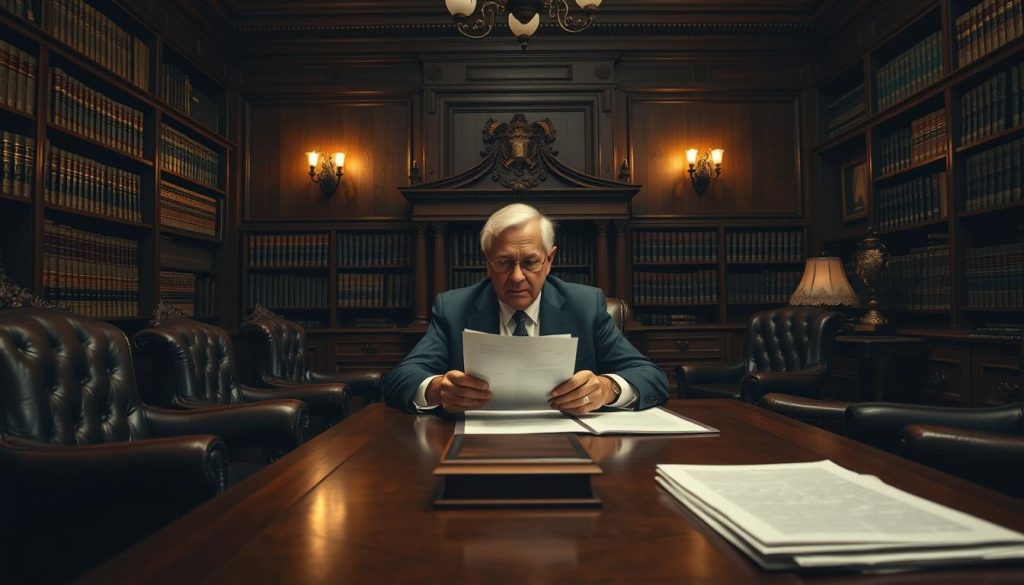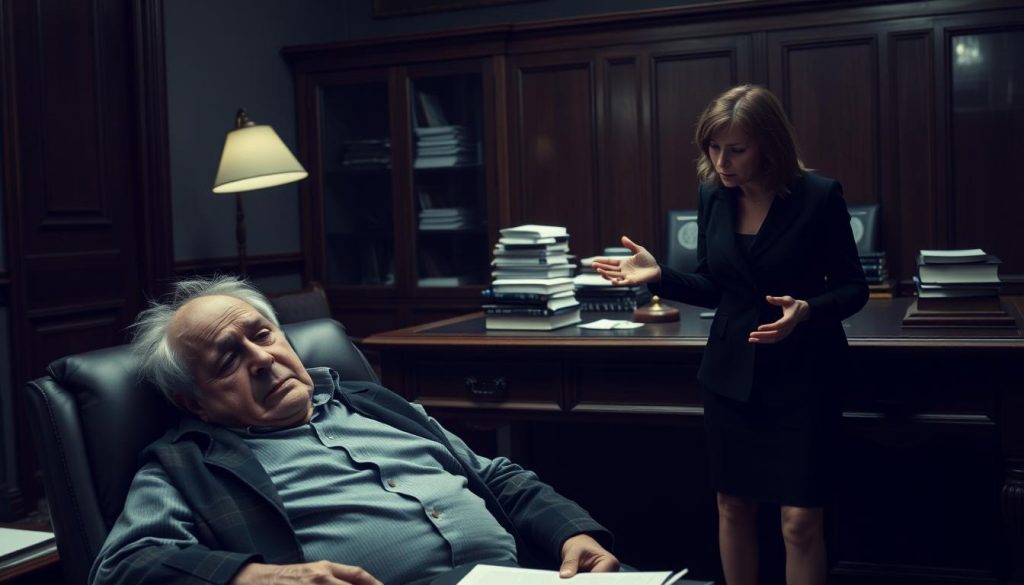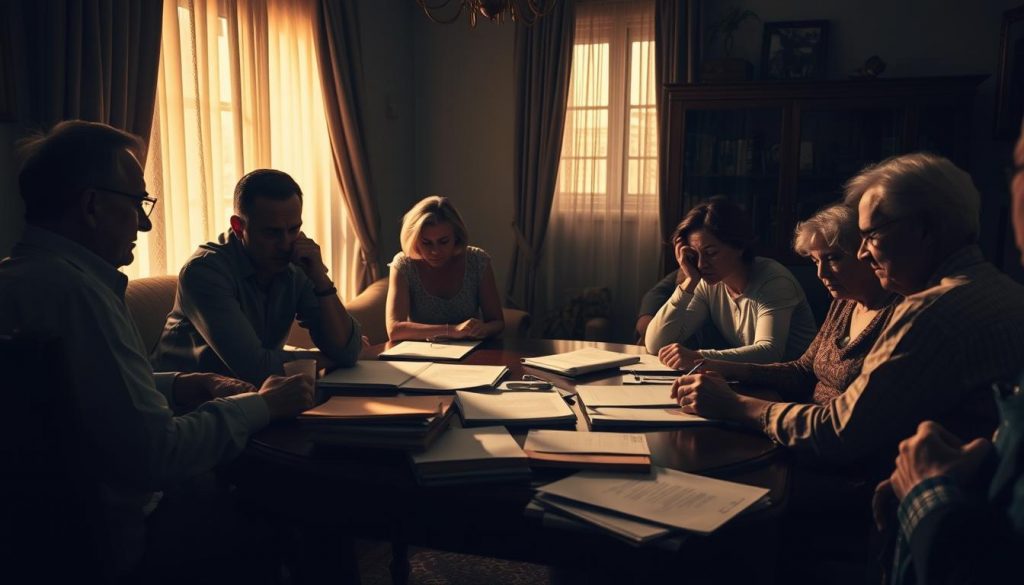Contesting a will can be a distressing experience, especially during a time of grief following the loss of a loved one. The emotional turmoil can be compounded by the complexity of legal proceedings surrounding inheritance disputes.
Understanding the grounds for contesting a will is crucial. It’s a significant decision that requires careful consideration of the legal framework and procedures involved. We will explore the valid reasons for challenging a will, ensuring you’re well-informed about the process.
We recognise that contesting a will is not a decision taken lightly. Our role is to guide you through the legal intricacies, providing clarity on the steps involved in protecting your inheritance.
Key Takeaways
- Contesting a will involves understanding the legal grounds.
- The process can be complex and emotionally challenging.
- Knowing the valid reasons for challenging a will is essential.
- Legal guidance is crucial for navigating inheritance disputes.
- Protecting your inheritance requires informed decision-making.
Understanding the Validity of a Will
To contest a will, one must first comprehend what makes it valid. A will’s validity is crucial in determining whether it can be contested.
What Constitutes a Valid Will?
A valid will must comply with the Wills Act 1837. This means it must be in writing, signed by the testator, and witnessed by at least two people.
For a will to be considered valid, the testator must have testamentary capacity, meaning they understand the nature of their actions and the consequences of their decisions.

Legal Requirements for Will Creation
The legal requirements for creating a will are straightforward but crucial. The testator must sign the will in the presence of two witnesses, who then sign in the testator’s presence. This ensures that the will is executed correctly and reduces the likelihood of disputes.
It’s also essential to understand that a will can be contested on several grounds, including lack of testamentary capacity or undue influence.
| Legal Requirement | Description |
|---|---|
| In Writing | The will must be documented in writing to be considered valid. |
| Signed by Testator | The testator must sign the will, indicating their approval of its contents. |
| Witnessed by Two People | Two witnesses must sign the will in the testator’s presence to verify its authenticity. |
The Role of Witnesses in Wills
Witnesses play a critical role in validating a will. They must be present when the testator signs the document and must also sign it themselves. This process helps prevent fraud and ensures that the testator is not under undue influence.
It’s worth noting that witnesses should not be beneficiaries of the will, as this could lead to conflicts of interest and potentially invalidate the will or parts of it.
Grounds for Contesting a Will
Understanding the grounds for contesting a will is crucial for those considering challenging a will. Contesting a will involves examining the circumstances under which it was made, and there are several key areas that can be challenged.
Lack of Testamentary Capacity
A person making a will must have testamentary capacity, meaning they understand the nature of their actions, are aware of their assets, and know who their beneficiaries are. If it can be shown that the person lacked this capacity due to illness, dementia, or other factors, the will can be contested.
For instance, if a person with advanced Alzheimer’s disease makes a will without understanding its implications, family members might contest it on the grounds of lack of testamentary capacity.
Undue Influence or Coercion
Undue influence occurs when someone exerts pressure on the testator, influencing the will’s contents in a way that doesn’t reflect their true wishes. This can be a family member, caregiver, or anyone else close to the testator.
For example, if a caregiver manipulates an elderly person into leaving them a significant portion of their estate, others might contest the will, claiming undue influence.
Fraud or Forgery Claims
If a will is forged or made under fraudulent circumstances, it can be contested. This might involve fake signatures or misrepresenting information to the testator.
A case where fraud might be claimed is if someone discovers that their deceased relative’s signature on the will was forged.
The following table summarises the main grounds for contesting a will:
| Grounds for Contesting | Description | Example |
|---|---|---|
| Lack of Testamentary Capacity | The testator did not understand the nature of their actions. | A person with advanced dementia making a will. |
| Undue Influence or Coercion | Someone influenced the testator’s decisions. | A caregiver manipulating an elderly person’s will. |
| Fraud or Forgery | The will was forged or made under fraudulent circumstances. | A forged signature on the will. |

Testators’ Intent and Beliefs
When a will is contested, understanding the testator’s true intentions becomes paramount. The testator’s intent and beliefs are crucial in interpreting the will and resolving potential executor disputes.
Interpreting the wishes of the testator involves a careful examination of the will’s language and the context in which it was written. We must consider the testator’s beliefs and intentions at the time of writing to ensure that their wishes are carried out accurately.
Interpretation of Wishes
Understanding the testator’s wishes is not always straightforward. The language used in the will may be ambiguous, leading to different interpretations. In such cases, we need to look beyond the literal meaning of the words to understand the testator’s true intentions.
For instance, a testator may have used terms or phrases that were common during their lifetime but are now outdated or have taken on different meanings. In these situations, clarifying the testator’s intent can help prevent inheritance disputes among beneficiaries.

Ambiguities in Language
Ambiguities in the language of a will can lead to probate litigation. When the testator’s intentions are not clear, it can result in disputes among beneficiaries or between beneficiaries and the executor.
To address these ambiguities, we examine the circumstances surrounding the creation of the will, including any communications or instructions provided by the testator. This helps to clarify any unclear provisions and ensures that the testator’s wishes are respected.
By carefully interpreting the testator’s intent and beliefs, we can work towards resolving disputes and ensuring that the estate is distributed according to the testator’s true wishes.
The Impact of Mental Capacity
Understanding the testator’s mental state when creating the will is vital for those considering contesting it. Mental capacity, or the testator’s ability to make informed decisions, is a crucial factor in determining the validity of a will.
Assessing Capacity at the Time of Writing
Assessing mental capacity at the time of writing the will is critical. This involves examining whether the testator understood the nature of their actions, was aware of the extent of their property, and could reason about the claims of potential beneficiaries.
To determine the testator’s mental capacity, we can look at various pieces of evidence, including:
- Medical records from the time the will was made
- Witness testimony from individuals who interacted with the testator
- Documentation of any mental health issues or cognitive impairments
Evidence of Mental Incapacity
Evidence of mental incapacity can significantly strengthen a case for contesting a will. This can include:
| Evidence Type | Description | Relevance |
|---|---|---|
| Medical Records | Documentation from healthcare professionals | Provides insight into the testator’s mental health |
| Witness Testimony | Statements from individuals who knew the testator | Offers first-hand accounts of the testator’s mental state |
| Cognitive Assessments | Professional evaluations of the testator’s cognitive function | Helps determine the testator’s ability to make informed decisions |
By carefully assessing the testator’s mental capacity and gathering relevant evidence, we can build a strong case for contesting a will based on lack of testamentary capacity.

The Role of Family and Relationship Dynamics
Understanding the intricacies of family relationships is essential when contesting a will. Family dynamics and relationship changes can significantly impact the outcome of such disputes.
Changes in Relationships
Changes in family relationships can often lead to disputes over a will. For instance, a testator may have altered their will in response to a change in their relationship with a beneficiary, potentially leading to claims of undue influence or coercion.
We have seen cases where a beneficiary feels they have been unfairly treated due to a change in the testator’s circumstances or relationships. This can lead to inheritance disputes that are challenging to resolve.

Family Expectations and Historical Context
Family expectations and the historical context of relationships within a family can also play a significant role in will contests. Understanding these dynamics is crucial for resolving probate litigation effectively.
| Factor | Impact on Will Contests | Considerations |
|---|---|---|
| Changes in Family Relationships | Can lead to disputes and claims of undue influence | Assess the nature of the change and its impact on the testator’s decisions |
| Family Expectations | Influence how beneficiaries perceive their inheritance | Understand the historical context and expectations within the family |
| Executor Disputes | Can arise from disagreements over the administration of the estate | Consider the role of the executor and their responsibilities |
By understanding these factors, we can better navigate the complexities of executor disputes and work towards a resolution that respects the testator’s intentions while addressing the concerns of all parties involved.
Procedural Considerations When Contesting
The process of contesting a will requires careful attention to procedural details. Contesting a will is a complex legal process that involves several key steps, from initiating the contest to navigating the legal system.
How to Initiate Contestation
To initiate a contest, one must file a claim with the court. This involves preparing and submitting the necessary legal documents, which typically include a claim form and particulars of claim. We recommend seeking legal representation to ensure that the process is handled correctly.
The initial steps in contesting a will include:
- Determining the grounds for contesting the will
- Gathering evidence to support the claim
- Filing the claim with the appropriate court
- Serving the claim on the relevant parties
Time Limits for Filing a Contest
There are strict time limits for contesting a will. In the UK, the general rule is that a claim must be brought within six months of the date of the grant of probate. However, this can vary depending on the circumstances, and we advise seeking legal advice to determine the specific time limits applicable to your case.
“The time limit for contesting a will is a critical factor, and missing this deadline can result in the claim being time-barred.”
Legal Representation and Costs
Legal representation is crucial when contesting a will. Solicitors specializing in probate law can provide invaluable guidance and representation. The costs associated with contesting a will can be significant, including legal fees, court costs, and potentially, the costs of the other party if the contest is unsuccessful.
| Cost Component | Description | Estimated Cost Range |
|---|---|---|
| Solicitor Fees | Fees for legal representation | £5,000 – £20,000+ |
| Court Costs | Fees associated with court proceedings | £1,000 – £5,000 |
| Expert Witness Fees | Fees for expert testimony | £1,000 – £3,000 |
Understanding these procedural considerations is essential for effectively contesting a will. We are here to guide you through this complex process, ensuring that your rights are protected.

Contesting a Will Based on Improper Execution
The execution of a will is a formal process, and if not done correctly, it can lead to disputes among beneficiaries and potential contests. When a will is not executed according to the legal requirements, it can be considered invalid or open to challenge.
Importance of Following Legal Formalities
Following the legal formalities for will execution is crucial to ensure its validity. This includes the signing of the will in the presence of two independent witnesses, who must also sign the document. Failure to adhere to these formalities can result in the will being contested.
Some common issues related to improper execution include:
- Signing the will without the presence of witnesses
- Witnesses not being independent or having a vested interest in the will
- Failure to sign or initial every page of the will
Mistakes Made During Property Transfers
Mistakes during property transfers can also lead to disputes and potential contests. This can include incorrect or incomplete transfers of assets, misunderstandings about the distribution of property, or failure to update the will to reflect changes in the testator’s circumstances.
To avoid such issues, it is essential to:
- Clearly outline the distribution of assets in the will
- Regularly review and update the will to reflect any changes
- Seek professional advice to ensure that the will is executed correctly
By understanding the importance of proper will execution and taking steps to ensure that the process is carried out correctly, individuals can reduce the risk of their will being contested.
The Influence of Previous Wills
Previous wills can significantly impact the validity and contestation of a current will. When a will is contested, the court often examines the history of the testator’s wills to understand their intentions and decisions regarding the distribution of their estate.
Understanding the influence of previous wills is crucial in contesting a will or resolving executor disputes. We will explore how revoked wills can affect the current will’s validity and the implications for contestation proceedings.
The Validity of Revoked Wills
A revoked will, although no longer in effect, can still provide valuable insights into the testator’s intentions and state of mind at the time of its creation. Courts may consider the contents of revoked wills when assessing the validity of the current will, particularly if there are allegations of undue influence or lack of testamentary capacity.
For instance, if a testator made significant changes to their will over time, such as disinheriting a family member, the previous wills can serve as evidence of their evolving intentions. As noted by legal experts, “the history of a testator’s wills can reveal patterns that may indicate undue influence or coercion.” Understanding the reasons a will gets can provide further insights into the role of previous wills.
“The previous wills of a testator can be a crucial factor in determining the validity of their current will, especially in cases where there are disputes over the testator’s mental capacity or allegations of undue influence.”
Impact of Previous Versions on Contestation
Previous versions of a will can impact contestation in several ways. Firstly, they can provide evidence of the testator’s intentions and help clarify any ambiguities in the current will. Secondly, significant changes between versions can raise questions about the testator’s mental state or potential undue influence.
- Evidence of changing intentions
- Potential undue influence or coercion
- Clarification of ambiguities in the current will
In conclusion, previous wills play a significant role in the contestation of a current will. Understanding their influence is essential for navigating the complexities of challenging a will and resolving disputes related to estate distribution.
Cases of Unsound Mind or Illness
The validity of a will often hinges on the testator’s mental capacity, making it a critical factor in probate litigation. When a testator’s mental health is called into question, it can significantly complicate the process of contesting or validating their will.
Mental Health Issues and Their Effects
Mental health issues can profoundly affect a testator’s ability to make informed decisions about their estate. Conditions such as dementia, Alzheimer’s disease, and other cognitive impairments can impact a person’s testamentary capacity, which is their legal ability to create a valid will.
We must consider how these conditions affect the testator’s understanding and decision-making processes. For instance:
- Dementia can cause memory loss and confusion, potentially leading to decisions that do not reflect the testator’s true wishes.
- Alzheimer’s disease progressively impairs cognitive function, which can affect a testator’s ability to understand the nature and extent of their estate.
- Other mental health issues, such as depression or delusional disorders, can also influence a testator’s capacity to make rational decisions.
Legal Precedents in Mental Incapacity Cases
Courts have established various legal precedents to guide the assessment of mental capacity in will contests. These precedents help determine whether a testator had the necessary mental capacity at the time of making their will.
Key factors considered in these cases include:
- The testator’s ability to understand the nature of their actions.
- Their comprehension of the extent of their estate.
- Their ability to appreciate the consequences of their decisions.
By examining these factors and relevant legal precedents, we can better understand how courts assess claims of lack of testamentary capacity and the impact of undue influence in probate litigation.
Potential Outcomes of Contesting a Will
The process of contesting a will is complex, and understanding the potential outcomes is crucial for those involved. When a will is contested, the court’s decision can have significant implications for all parties.
Possible Court Decisions
When contesting a will, the court’s decision can vary based on the evidence and arguments presented. Possible outcomes include:
- The will being upheld in its entirety.
- The will being declared invalid, potentially leading to an earlier will being used or intestacy rules applying.
- A partial revision of the will, adjusting certain provisions while leaving others intact.
Table: Potential Court Outcomes
| Court Outcome | Description | Impact |
|---|---|---|
| Will Upheld | The court validates the will as it stands. | No changes to the will’s provisions. |
| Will Declared Invalid | The court invalidates the will, potentially reverting to an earlier will or applying intestacy rules. | Significant changes to inheritance, potentially benefiting other parties. |
| Partial Revision | The court adjusts certain provisions of the will. | Changes to specific inheritances or conditions. |
Impact on Family Relations
Contesting a will can have a profound impact on family relations. The process can lead to strained relationships, especially if family members have differing opinions on the validity or fairness of the will. It’s essential to consider the potential emotional and relational costs when deciding to contest a will.
Understanding the potential outcomes and being prepared for the consequences can help individuals make informed decisions about contesting a will.
Mediation and Alternative Dispute Resolution
In the UK, disputes over wills are increasingly being resolved through mediation and alternative dispute resolution methods. These approaches offer a less confrontational and often less costly alternative to traditional litigation.
Opportunities for Settlement
Mediation provides a platform for parties to negotiate and settle disputes with the help of a neutral third-party mediator. This process can be particularly beneficial in cases involving complex family dynamics or emotional disputes.
Some key opportunities for settlement through mediation include:
- Facilitating open communication between parties
- Encouraging creative solutions that satisfy all parties
- Reducing the emotional strain associated with probate litigation
Benefits of Mediation Over Litigation
Mediation has several benefits over traditional litigation, particularly in the context of executor disputes and inheritance disputes. These benefits include:
| Aspect | Mediation | Litigation |
|---|---|---|
| Cost | Generally less expensive | Can be very costly |
| Time | Often resolves disputes more quickly | Can be lengthy |
| Emotional Impact | Less confrontational, preserving family relationships | Can be highly adversarial |
By choosing mediation, parties can avoid the potentially damaging effects of probate litigation on family relationships and achieve a more satisfactory outcome.
Conclusion: Weighing the Decision to Contest
Contesting a will is a significant decision that can have far-reaching emotional and legal implications. Throughout this article, we have explored the various reasons to contest a will, from questioning the validity of the will to concerns about undue influence or coercion.
The Emotional Cost
Contesting a will can be emotionally draining, affecting family dynamics and relationships. We understand that contesting a will is not just a legal matter but also a personal and emotional challenge.
Professional Guidance
Seeking professional advice is crucial when considering challenging a will. Experienced legal professionals can provide guidance on the best course of action, helping to navigate the complexities of the law and ensuring that your rights are protected.
By understanding the grounds for contesting and the potential outcomes, you can make an informed decision about how to proceed. We recommend consulting with a legal expert to discuss your specific situation and determine the most appropriate steps to take.


